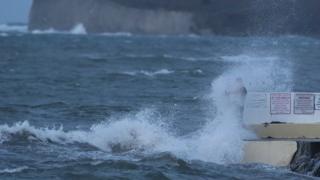Storm Callum: Disruption to travel and power supplies
 Image copyright
Press Association
Image copyright
Press Association
Storm Callum has swept in, bringing 70mph winds and disruption to travel and power supplies across some parts of the UK and Ireland.
An amber warning is in place across much of Wales as winds hit 72mph and hundreds of homes are without power.
More than 1,000 homes and businesses across Northern Ireland are also without electricity.
A number of flights have been cancelled at Belfast City, Cardiff and Dublin Airports.
The Friday morning London Stansted to City of Derry Airport flight was diverted to Belfast International Airport after the pilot aborted landing due to high winds.
Belfast International Airport has warned of potential flight delays.
The Met Office has issued a yellow warning for South West England, North East England, North West England, South West Scotland, Lothian Borders, Wales and Yorkshire and Humber.
An area of Exmouth seafront, which is set to be protected by a £12m tidal defence scheme, has flooded. Police have warned people to stay away from the coastline.
In many areas, the clear-up is under way.
Fallen trees were blocking the Tassagh Road in Keady in County Armagh and the Scarva Road heading out of Gilford in County Down, while a tree also came down on the road at Windsor Avenue in south Belfast.
The storm has brought rain and severe gales to parts of Ireland and Wales, with the strongest gusts expected in coastal areas.
How is transport affected?
Most FlyBe flights travelling to and from Belfast City Airport between 06:00 and 09:30 BST have been cancelled.
Belfast International Airport said that while all flights are still scheduled, there may be knock-on delays.
More than 25 Aer Lingus flights travelling to and from Dublin airport have been cancelled.
Stena Line has said that the adverse weather caused a delay to its 07:30 service between Belfast and Cairnryan.
Translink has warned that the punctuality of rail services will "regretfully be adversely affected" while Arriva Trains Wales has put on replacement bus services and cancelled some trains.
Trains are also subject to speed restrictions while the A55 Britannia Bridge between Anglesey and the Welsh mainland has been closed to high-sided vehicles, with one lane shut on the M48 Severn crossing.
But the worst of the wind is expected to have finished after Friday morning's rush-hour commute.
What's the forecast?
In Northern Ireland, a yellow warning has been issued by the Met Office for strong winds.
The agency says some delays to road, rail, air and ferry transport are likely because of the storm.
The strongest gusts of more than 60mph are expected to have reached their peak on Friday morning, before winds slowly begin to ease.
The Randox NI Potato Festival, scheduled for Saturday in Bushmills, County Antrim, has been cancelled due to adverse weather conditions.
An amber warning for heavy rain has been issued for most of south Wales on Friday.
In the Republic of Ireland, weather service Met Éireann has issued the second highest level of warning - a Status Orange - for all coastal counties.
The agency warns there is a risk of coastal flooding and damage, especially along the south and west coasts, as the storm coincides with high tides.
The warning also tells people to "stay away from exposed coastal areas for the period of the orange warning".
Gusts along the west coast could be in excess of 80mph.
Where are the power outages?
Northern Ireland Electricity (NIE) says more than 900 homes and businesses in Lisburn, County Antrim, are without power.
A further 150 homes and businesses in Lurgan in County Armagh and Ballinamallard in County Fermanagh are also without electricity.
NIE has opened 12 incident centres across Northern Ireland to respond to any damage to the network.
It has urged people to stay away from fallen overhead power lines and to report any electricity network damage to 03457 643 643.
Storm Callum is the third named storm of the season and follows Storms Bronagh and Ali in September.
During the 2017-18 season, there were 11 named storms.
Have you been affected by Storm Callum? Tell us about your experiences by emailing haveyoursay@bbc.co.uk
Please include a contact number if you are willing to speak to a BBC journalist. You can also contact us in the following ways: